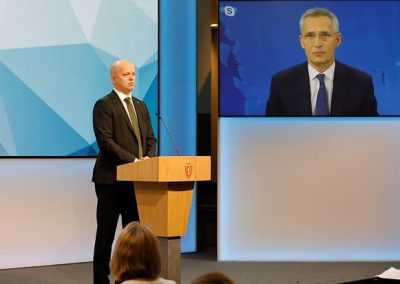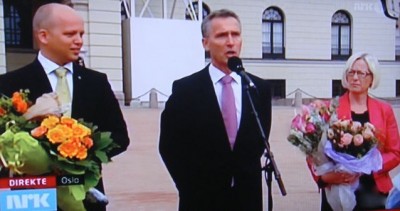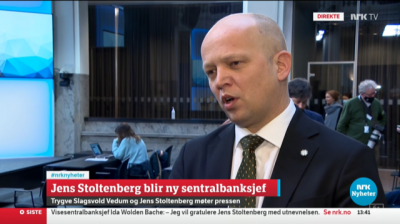A Parliamentary investigation looms into the hiring process that resulted on Friday in the appointment of Jens Stoltenberg as the new chief of Norway’s central bank. Stoltenberg, a former two-term prime minister for the Labour Party who’ll be leaving his current job as NATO’s secretary general this fall, was officially hired by the current Labour-led government, raising lots of questions about political camaraderie and the central bank’s independence.

Stoltenberg’s candidacy for the job was highly controversial, and still is. No one questions his credentials, only how he suddenly popped up as a rival to the bank’s current deputy leader, who was also highly qualified and had seemed assured of getting the job.
Debate has been flying ever since it emerged last fall that Stoltenberg was interested in the job that formally carries the title of “governor” of Norges Bank. The top candidate to replace the central bank’s retiring governor, Øystein Olsen, had long been Ida Wolden Bache, an expert on monetary policy and current deputy governor who’s consistently described as highly competent and experienced. She also would have been the first woman to lead the central bank.
Suddenly Bache faced tough competition from the popular and well-known Stoltenberg, who also has become an international celebrity of sorts as head of NATO. When the finance ministry, in charge of hiring the central bank chief, finally published its obligatory “help wanted” ad for the post, its text appeared tailor-made for Stoltenberg. Never before had the job of central banker required earlier experience in leadership of “complex organizations” and, not least, an ability to “be able to handle demanding situations” such as “crises” and situations requiring “preparedness,” all of which were written into the ad.
Olsen himself had come from Norway’s state statistics bureau SSB, but managed to lead the bank well through several crises including the oil price collapse and the pandemic. Suddenly people with his background wouldn’t have qualified either, and he probably wouldn’t qualify for his own job. Stoltenberg, meanwhile, confirmed his interest in the job and his name turned up on the list of applicants that the ministry is obliged to reveal.
Vedum opted against more ‘ordinary people’
Finance ministry bureaucrats who’d formulated the ad ended up recommending Stoltenberg to the government, and specifically Finance Minister Trygve Slagsvold Vedum, who was responsible for the actual hiring. As opposition to Stoltenberg’s candidacy rose in Parliament, mostly over all his political connections and positions over more than three decades, many believed Vedum would choose Bache over Stoltenberg. Vedum has long ridiculed the so-called “elite” and powerful professional and social networks, campaigning before the last electon on behalf of vanlige folk (ordinary people).
Commentator Kjetil B Alstadheim had questioned in newspaper Aftenposten whether Vedum would reject Stoltenberg’s job application, especially after media reports that Stoltenberg’s candidacy had come up at various “elite” dinner parties. They involved the son of former Labour Prime Minister Gro Harlem Brundtland, the new billionaire boss of Norway’s Oil Fund (which is managed through the central bank) and current Labour Prime Minister Jonas Gahr Støre, who’s a longtime personal friend of Stoltenberg’s. Stoltenberg had also appointed Støre as his foreign minister when he held office from 2005 to 2018.

Stoltenberg appointed Vedum himself, too, as agricultural minister during his second term as prime minister. Vedum represents the Center Party, which was part of Stoltenberg’s Labour-led coalition government and is now as well. It was Vedum’s first ministerial post, and Stoltenberg was effectively boss for both Vedum and Støre.
That’s also why it’s raising eyebrows that Vedum and other government ministers who owe a lot of their political success to Stoltenberg went ahead on Friday and formally hired the man who earlier had hired of them. And why a majority in Parliament is now moving forward with a probe of the process behind Stoltenberg’s hiring in the Parliament’s “control and constitution committee,” the equivalent of the national assembly’s disciplinary arm. Not only the right-wing parties question the Labour-Center government’s choice, so do several of those on the left, including the Reds, the Greens and the Liberals in the middle. Former government minister Sveinung Rotevatn of the Liberals told state broadcaster NRK on Friday that “when the criticism is so massive, it’s not unproblematic” that such an appointment has been made. “This doesn’t bode well,” Rotevatn said, also that the government was not taking the criticism seriously.
Tina Bru of the Conservative Party congratulated Stoltenberg but also noted the “unrest” over his political background because the central bank is supposed to be above politics. “It’s the government’s privilege to appoint the central banker,” Bru told NRK, but she said her party was not content with Stoltenberg’s political background.
Turning liabilities into strengths
Vedum and Stoltenberg himself argued exactly the opposite at a press conference following his appointment on Friday. Vedum read from a prepared statement that stressed the advantages of Stoltenberg’s political experience, his role in helping to form the Oil Fund more than 20 years ago, along with his international experience and crisis management skills honed at NATO. Vedum claimed Stoltenberg has “a clear understanding” of his role and the “integrity” to know his limits.

Stoltenberg in turn thanked Vedum via video link from his NATO office in Brussels for having confidence in him and stressed that he has “great respect” for the role of the central bank and the independent institution it was set up to be. In an era of conflicts all over the world and rapid technological change, Stoltenberg added, he’s more than ready to take on the challenges of leading the country’s central bank, the role it plays in the economy, the country’s monetary policy and, not least, the Oil Fund itself, which has grown into a huge sovereign wealth nonetheless vulnerable to stock market dives.
“I’m very confident that I can do the job,” said Stoltenberg, also stressing that running the central bank is “a team effort.” He noted that Bache had called him to congratulate him on his appointment as her new boss and he said he was glad she’ll be staying on at Norges Bank, even serving as acting governor from March 1, when current governor Olsen will retire, until Stoltenberg takes over by the end of the year. Stoltenberg is committed to remain at NATO until October 1, during which time the alliance needs to find a replacement for him while also dealing with Russia’s aggression against Ukraine and even China’s aggression against Taiwan. It’s been reported earlier that Stoltenberg was asked to further extend his term as NATO secretary general, but Stoltenberg said he’s looking forward to move home to Norway and, now, to his new job.
Vedum said it “would have been easier” to appoint someone other than Stoltenberg, not least since Bache was viewed by many as the best professional candidate with a doctorate in finance and hands-on operational experience, but he agreed with the finance ministry’s assessment that Stoltenberg was the best on an all-around basis. Vedum seems willing to weather the storm of a parliamentary inquiry and all the controversy and criticism still swirling. Stoltenberg, too, although it may have died down somewhat by the time he takes office, if all goes as planned.

Bache nonetheless has had lots of supporters, including former Finance Minister Siv Jensen, who’s been most worried about the reputation of and confidence in Norges Bank, also abroad. Two out of three Norwegians surveyed last month also opted for Ida Wolden Bache, making her the “people’s choice” for the job along with those who cited her utter lack of political connections and strong academic credentials with a doctorate in currency valuation. Others have even argued that the government, which has struggled during its first three months in office, would be better served with a central banker who wouldn’t overshadow themselves.
Bache has remained mostly silent during the entire drama swirling around the top job at Norges Bank. On Friday she continued to exhibit what some commentators have called her high degree of professionalism by issuing a statement in which she congratulated Stoltenberg on his appointment as central bank chief. She wrote that she has “great respect for Stoltenberg, and together with Norges Bank colleagues I look forward to work with him during the coming years.” That indicates she has no plans to quit even after being passed over for the top job.
Bache added that she’s confident the finance ministry carried out “thorough and good evaluations during the employment process.” She also said she looked forward to work as acting central bank chief until Stoltenberg takes over: “As deputy governor and deputy leader of the board, it’s natural for me to accept such an offer.”
She concluded by saying that she had applied for the top job at the central bank “because I have a strong engagement for Norges Bank, our competent colleagues and our role in society. I will carry that engagement with me during the months I will function as central bank chief.” There was little sign of disappointment or any bitterness in her reaction to losing out to Stoltenberg.
Norway’s strong economy, meanwhile, doesn’t mean that Norges Bank and especially its Oil Fund are immune from trouble ahead. Any country’s central bank plays a important role when markets collapse or conflicts threaten the economy. The Oil Fund itself could come under attack, and Stoltenberg could then emerge as the best leader in a crisis. Norges Bank and the the Oil Fund are already bracing for tougher times ahead, despite huge earnings for the fund again last year. It’s now worth a dizzying NOK 12,340 billion, equal to NOK 2.3 million for every resident of Norway. The government is also faced with re-examining current rules for how much of the fund can pad the state budget on an annual basis, while still keeping it ready to fund pensions for future generations.
“I’m confident that I can do the job,” said Stoltenberg on Friday, stressing that he’s learned to be politically neutral in his top job at NATO. He added that “it’s not unusual for central bank leaders to have a political background in other countries,” so he doesn’t think that’s a problem for the central bank’s reputation either. He said he’ll remain “a social democrat” and be a member of the Labour Party, but without holding any offices or being active. He’ll also maintain his friendships with politicians like Prime Minister Støre, but remain conscious of what can and can’t be talked about.
“I was prepared there’d be debate over this,” Stoltenberg said, and so was Vedum. “The Parliament has a right to ask questions,” Vedum said, “and we’ll be ready to answer them.”
newsinenglish.no/Nina Berglund

